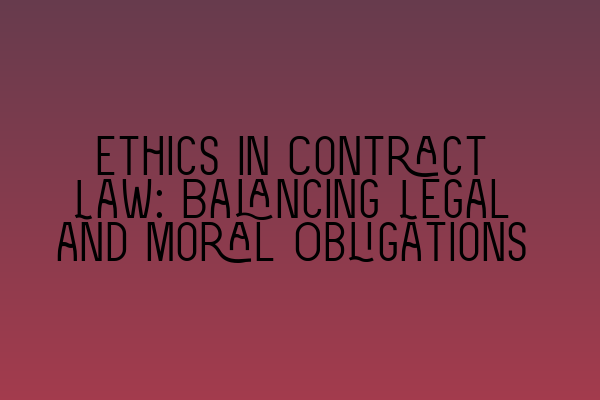As solicitors, we are bound by legal and ethical obligations in our practice of contract law. While our primary duty is to our clients and the pursuit of their legal interests, we must also consider the broader moral implications of our actions. Balancing these legal and moral obligations can be a complex task, but it is essential to maintain the integrity of the legal profession and ensure fair and just outcomes for all parties involved.
The Legal Framework
In contract law, our primary obligation is to represent our clients’ interests within the boundaries of the law. We must ensure that our clients enter into valid and enforceable agreements that protect their rights and fulfill their obligations. This involves providing accurate legal advice, negotiating favorable terms, and drafting clear and comprehensive contracts.
However, it is crucial to remember that the law is not static and may evolve over time. As solicitors, we have a duty to stay informed about changes in legislation, case law, and legal precedents that may impact contract interpretation and enforcement. This continuous learning and professional development ensure that we can provide our clients with the most up-to-date and accurate legal advice.
It is also important to note that contract law operates within a larger legal framework that encompasses other areas of law, such as torts, property, and equity. When advising our clients, we must consider how contract law interacts with these other legal concepts and obligations to provide a comprehensive understanding of their rights and liabilities.
Moral Considerations
While contract law provides a set of rules and principles for resolving disputes and enforcing agreements, it does not necessarily address broader moral concerns. As solicitors, we have a responsibility to consider the ethical implications of the contracts we draft and negotiate. This includes assessing the fairness and equity of the terms, the impact on vulnerable parties, and the potential for harm.
For example, we may encounter situations where a contract, while legally valid, may exploit or harm one party unfairly. In such cases, we must balance our duty to our client with our moral responsibility to ensure justice and fairness. This may involve negotiating more equitable terms, advising our clients against unethical practices, or even rejecting a client’s instructions if they go against our ethical principles.
Furthermore, our moral obligations extend beyond the immediate parties involved in a contract. We must consider the impact of our actions on society as a whole and uphold the public interest. This includes promoting transparency, honesty, and integrity in contractual relationships and avoiding any actions that could undermine the public’s trust in the legal profession.
Striking the Balance
Balancing legal and moral obligations in contract law requires careful consideration and judgment. One way to achieve this is by integrating ethical decision-making frameworks into our practice. These frameworks help us evaluate the ethical implications of a contract and guide us in making morally sound decisions.
For instance, the utilitarian approach considers the overall consequences of a contract and aims to maximize the well-being of all parties involved. The deontological approach, on the other hand, focuses on adherence to moral duties and principles, regardless of the outcome. By applying these ethical frameworks, we can navigate the complexities of contract law while upholding our moral obligations.
Continuing professional development is another crucial aspect of balancing legal and moral obligations. By staying informed about emerging ethical issues in contract law, participating in training programs, and engaging in discussions with colleagues, we can enhance our ethical decision-making skills and ensure that our practice aligns with the highest ethical standards.
Conclusion
Ethics in contract law go beyond the strict application of legal rules. As solicitors, we must maintain a delicate balance between our legal duties and our moral obligations. By considering the broader implications and ethical aspects of the contracts we draft and negotiate, we can ensure fair and just outcomes for our clients and uphold the integrity of the legal profession.
For further preparation for the SQE exams and to enhance your understanding of contract law, check out our related articles:
